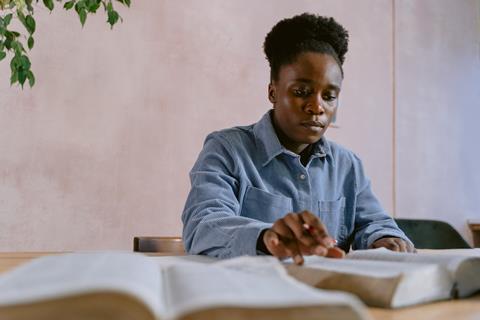Writer Macaila Britton was on the brink of burnout when she decided to embrace a month of Godly meditation. Here she explains how the experience changed her perspective on her relationship with the Father.

The world and my thoughts were too loud. No matter how hard I tried to focus, my brain felt like it was going to explode. If it were a laptop, it would have emitted a horrendous noise, puffed out smoke, and poof burst into flames for being overworked. So, I did a biblical meditation for 30 days — this is what happened.
I hesitated to meditate as a Christ follower because I didn’t want to root myself in affirmations or prioritise meditation practices that teach “me” and “I”. As wonderful it is to be in touch with yourself, as women of faith, we must know ourselves through God and who He says we are and calls us to be—not the worldly role or view of us. In the Bible, Jesus and other faith figures actively practice stillness to deepen their relationship with the Father. I longed for another tool to help me show up better in my relationship with Christ and life in general. So, I did what any of the Bible characters would do in the 21st century…I searched Christian meditations and found a free app.
My intention was to reap the benefits. A quick reset. But that didn’t happen. How was it I couldn’t sit still for one minute? 60-seconds. My mind constantly wandered to something—work, what a friend said, and unrealistic pressure I put on myself to be in “X” spot instead of “Y”. I quite literally had to shake the thoughts away; sitting in a dark room moving my head left and right, hoping the distractions would shoot out of my ears. They never did.
I did what any of the Bible characters would do in the 21st century…I searched Christian meditations and found a free app.
I was ashamed for failing to make still space for God to show up or to be myself without the noise. I hadn’t heard him speak. I hadn’t felt any different. Like our relationship with God and prayer, it isn’t a quick fix. Meditation and God aren’t whiteout we apply when we don’t like a choice we’ve made or an answer. I asked myself what would happen if I spent at least 60-second for the next 30-days meditating. What was the worst that could happen listening to Bible verses and seeking biblical stillness? No one was going to be hurt and I wasn’t risking financial loss.
I realised the constraints I placed on God. Meditation uncovered toxic learned behavior from previous churches/media saying how a relationship with God is supposed to look—if you’re not praying a certain way, reading dozens of Bible chapters, preaching, and ministering, you’re a “bad Christian”. That’s not true. If I forgot to pray, He still loves me. If I recite a verse from memory, learned from childhood—wonderful!
Meditation uncovered toxic learned behavior from previous churches/media saying how a relationship with God is supposed to look.
He welcomes us no matter what we are capable of showing up with or how—arms wide open asking for comfort and guidance, humming along to a worship song, or sitting in silence with no idea what to say or do. God wants us to spend time with Him and know Him. Obviously reading His word is a priority, but He doesn’t disown us or stop loving us if we meet him differently each day. God looks at the heart, not a to-do list or calendar.
Meditation helped me see how I strive to be worthy of being with God. I never will be and yet he loves me. Meditation, like our relationship with God, isn’t’ supposed to be a replica of someone else’s experience. When I decided to show up and commit to my spiritual growth, I was able to tune into myself and listen to what my mind/body needed. The conversational aspect of my relationship opened up outside of a formal prayer and I was able to exist with God, talking with him instead of to him. My spiritual life felt less isolated to the other areas/interests. Ten days into the challenge, I craved the stillness from my morning meditation and found the breathing to be centering and a tool for anxiety. The verse or a word would spring forth when imposter syndrome attacked or between prickly moments with others. Above all, I realised, like the mediation app, God is as accessible to me if only I took the time to seek him as often as I scrolled, pressed play, or doubted myself. And meditation helped me see how available God is to me and the tools He provides for me to know him.



































No comments yet